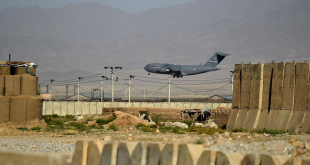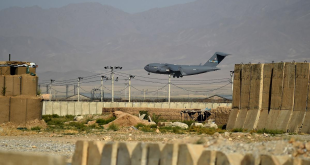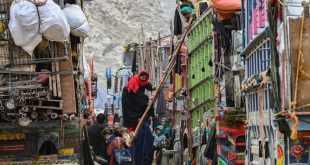National Security Advisor, Haneef Atmar, speaks about achievements and challenges to security in Afghanistan and the path to peace at the United States Institute of Peace
AT News Report-On March 22, the US Institute of Peace (USIP) hosted a conversation with Afghanistan’s National Security Advisor H.E. Mohammad Haneef Atmar. USIP President Nancy Lindborg introduced Minister Atmar, who gave remarks and then engaged in a conversation with USIP Board Chair and former US National Security Advisor Steven Hadley.
H.E. Atmar began by crediting USIP for its substantial work in promoting Afghan stability. He expressed profound gratitude for the sacrifices over many years by American soldiers, diplomats and civil society experts who had served in Afghanistan. He explained Afghanistan is profoundly different now as a consequence of this partnership with Americans, citing the way girls are educated and the civic culture. He specifically thanked American taxpayers for giving Afghans better health care, education and an improved standard of living.
H.E. Atmar then described the context of President Ghani’s recent peace offer, describing the threat as emanating from a nexus of violent extremism and transnational criminal networks, as well as covert state sponsorship of terrorism. He described this as a threat not only to Afghanistan, but to the region and the global community. This common threat from common enemies requires a shared mission. The bad actors include global terrorist organizations, e.g., Al Qaeda and ISIS/Daesh, increased numbers of foreign fighters, and also regional extremists from Central Asia, China and Pakistan. All of these, he said, were drawing on the “criminalized economy”, principally the drug trade.
Regarding the increase in foreign fighters, Atmar recalled that four years ago, in addition to 320,000 Afghan troops, there were 140,000 international troops in country, many leading a combat mission against these threats. Today the Afghan security sector has been given the responsibility to secure the country. He described his government’s effort to create an “enabling environment”, and described support from the international community as “mixed”. Pakistan, he declared, has not been supportive at all. The consensus on how to fight the terrorists has “broken slightly.” Some in the region make a distinction between “good and bad terrorists”, causing the breakdown in consensus.
H.E. Atmar described the best counter-terrorism approach as separating the Afghan Taliban from external extremists, because then the latter would have no foothold in the country. He resisted the view of those who see an “internal contradiction” in this strategy, saying the goal should be peace and reconciliation with Afghan extremists and defeat of international terrorists. This, he said, was the logic underlying President Ghani’s peace proposal. He cited the Afghan constitution’s protection of the rights of women and minorities as central to the government’s position.
There has been no official response from the Taliban, who are still deliberating. Unfortunately, H.E. Atmar noted, there has been an increase in violence since the President’s proposal was made, indicating that some oppose peace. The Afghan government, he said, will not be deterred by the violence and will pursue peace while strengthening its security capabilities.
H.E. Atmar listed several lines of effort by his government: 1) strengthen the Afghan national security forces; he added that the Administration’s South Asia strategy provides a good basis to do this; 2) pursue national consensus, in which women see themselves in the process and minorities are comfortable; this must be “a peace process for all Afghans”; 3) promoting an intra-Afghan process of dialogue; 4) maintaining alignment between Afghanistan and the US; 5) engendering regional cooperation including consensus and support against terrorism; 6) requesting help from Saudi Arabia and the GCC to play a leading role and using the Kingdom’s “enormous influence” to promote the intra-Afghan dialogue. This includes resolving the role of the Taliban office (in Doha); he noted this office can play a role, but it must start advancing peace if it is to remain open 7) fostering cooperation with Pakistan, whose role is “central” to peace and the counter-terrorism effort; he said the Afghan government is engaging with Pakistan at different levels, urging Pakistan to offer concrete measures to support peace and reconciliation. The Taliban insurgency, he asserted, cannot continue without having sanctuaries.
Responding to questions from Mr. Hadley and audience attendees, H.E. Atmar said that a peace dialogue will not be sufficient; there must be incentives and disincentives to support the President’s initiative. The government will start with “reconcilables” to develop a “solid national consensus for peace.” The mechanism for national consultation and reconciliation, he said, is the High Peace Council, representing “almost all” political actors as well as Afghan civil society.
H.E. Atmar expressed the hope that Russia, Iran and others will see their way clear to play a constructive role. Asked about China’s role, he said help was needed to curb the activities of the Eastern Turkistan Islamic Movement, which originates in China and transits a complex route to enter Afghanistan from Pakistan. Further, the Government has estimated that this group has 300-500 fighters in Afghanistan, some of which have been arrested after attacks on civilians including families and children. China’s One Belt One Road initiative, he noted, requires security in Afghanistan to fulfill its economic potential. Atmar opined that China’s “soft incentives” to encourage the Taliban to cooperate with the peace process are welcome, but “disincentives” also are needed from China to deal with the “irreconcilables”.
Regarding the political rivalries between regions and their governors, H.E. Atmar confirmed that President Ghani believes there is a common threat to all Afghans, and the process of reconciliation and unity the government is seeking is aimed at their shared interests. He stated there must be “ground rules” regarding the role of Islam in the country, rejecting the Taliban’s version. Additionally, democracy and human rights need to be upheld within the country. With these three ground rules – on the role of Islam, the commitment to democratic norms, and the protection of human rights – he contended unity can be achieved in Afghanistan.
 Afghanistan Times
Afghanistan Times




